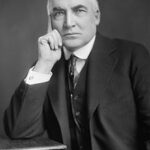President Warren G. Harding signed the Emergency Quota Act in 1921. This law created the foundation for America’s most restrictive immigration system. The Harding Immigration Act introduced national origin quotas that favored Western European immigrants.
The Emergency Quota Act Decision
Harding signed this legislation on May 19, 1921. The act limited annual immigration to 3% of each nationality’s 1910 census numbers. This system dramatically reduced immigration from Southern and Eastern Europe. Italian, Polish, and Jewish immigrants faced severe restrictions. The law reflected post-World War I isolationist sentiment and economic fears. 📊
Discriminatory Quota System
The quota system clearly favored Northern and Western Europeans. British and German immigrants received the largest quotas. Southern Europeans saw their immigration opportunities slashed by 80%. The law completely excluded most Asian immigrants through existing exclusion acts. This created a racial hierarchy in American immigration policy. ⚠️
Path to the 1924 Immigration Act
Harding’s 1921 law provided the framework for even harsher restrictions. The 1924 Johnson-Reed Act reduced quotas to 2% based on 1890 census data. This further limited non-Western European immigration. The system remained America’s primary immigration law until 1965. These policies institutionalized ethnic and racial discrimination in federal law. 💰
Impact:
The Harding Immigration Act fundamentally transformed American immigration policy for four decades. The quota system created lasting demographic and social changes across the United States.
Immediate Social Consequences
Families faced permanent separation due to restrictive quotas. Italian immigration dropped from 222,000 in 1921 to 42,000 in 1924. Polish and Eastern European communities saw similar dramatic reductions. Many immigrants already in America could not bring relatives. The policy created underground networks to circumvent restrictions. Ethnic communities became more insular and self-reliant. 🔥
Economic and Cultural Impact
American industries lost access to traditional labor sources. Agriculture and manufacturing faced worker shortages in certain regions. The policy encouraged internal migration of African Americans northward. Cultural diversity in major cities slowed significantly. Ethnic neighborhoods became more established and permanent. The restrictions reduced competition for jobs among working-class Americans. 📉
International Relations Effects
European allies criticized America’s discriminatory policies. The quota system damaged relationships with Southern and Eastern European nations. Asian countries viewed the exclusions as racist and insulting. The policy contributed to America’s isolationist reputation during the 1920s. International goodwill suffered as America rejected immigrant populations. These tensions persisted through World War II and beyond. 🌍
Long-term Historical Legacy
The Harding Immigration Act established precedent for ethnicity-based federal policy. The system remained unchanged until the Hart-Celler Act of 1965. Millions of potential immigrants were denied entry over four decades. The policy influenced American attitudes toward diversity and multiculturalism. Modern immigration debates still reference these restrictive precedents.
